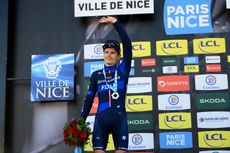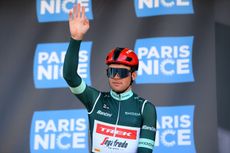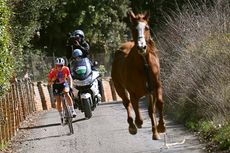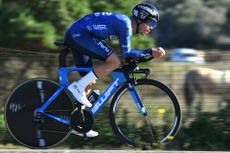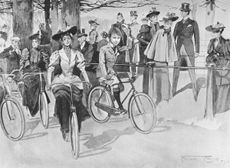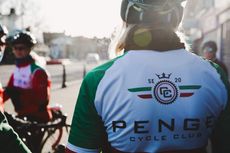"Failing that drug test was the best thing that had ever happened to me"
Abuse victim and disgraced champion Geneviève Jeanson finds solace in return to bike racing
- (opens in new tab)
- (opens in new tab)
- (opens in new tab)
- Sign up to our newsletter Newsletter
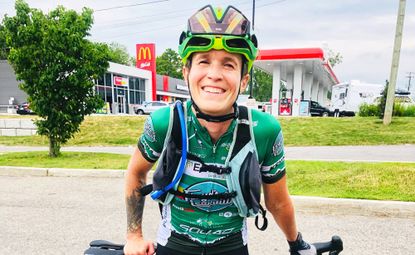

Trigger Warning: This article contains details that may affect those who have experienced physical or sexual abuse or know someone affected by it.
Geneviève Jeanson thought the door had been closed for good. She’d never again pin on a race number. Never again toe the startline of a bike race, hear the blast of a starter pistol or raise her arms in victory.
In 2007, her voice had rang clear when she announced she ‘won’t ever race again’ following her confession to having been administered EPO ever since she was 16 years old.
But in 2022, 17 years after her last race, the now 41-year-old Canadienne returned to racing, joining the ranks of former pro roadies in the growing discipline of gravel racing as part of the Floyd's of Leadville Racing team.
Going back has been a “big ball of emotions,” Jeanson tells Cycling Weekly. “But I’m so glad I did come back. I feel more like myself this year at 41 years old than I've ever felt in my life.”
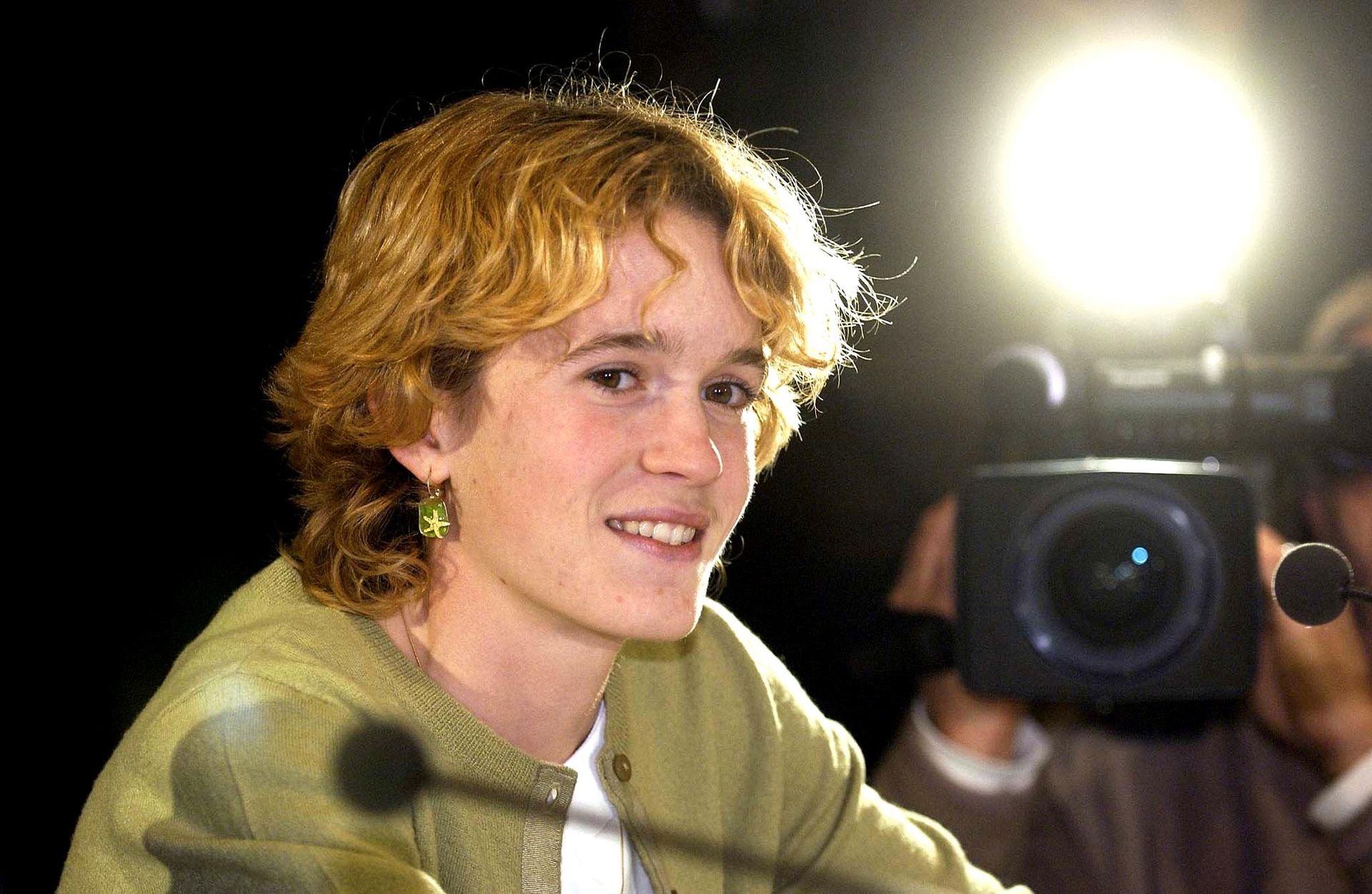
A young Genevieve Jeanson denies having taken any banned substances
Doping was only small part in a system of abuse
For those unfamiliar with Jeanson’s story, I have to warn you that it’s not a happy one.
In the early aughts, Jeanson was a star on the rise. A junior time trial and road racing world champion, a Flèche Wallonne winner and an Olympian at the tender age of 18. Her early twenties added even more world cup wins, stage race honors and national title to her palmarès. But then in 2005, her career came to an immediate halt. She’d tested positive for aerobic capacity booster, EPO, in an out-of-competition test. She initially denied taking the banned substance and announced her retirement months later. She was just 24 years old. Upon coming clean, she was given a lifetime ban that was later reduced to 10 years. Her coach André Aubut and doctor Maurice Duquette were banned for life for administering a banned substance to a minor.
While history quickly wrote her off as a cheat, over time we learned that there was a lot more going on than an athlete breaking the rules to get ahead.
In 2015, Jeanson cautiously came forward and started shedding some light on what had actually been going on. But it would take another six years for her to find the courage to share the full truth — a harrowing tale of over a decade’s long physical, emotional and sexual abuse at the hands of Aubut whom she met at age 14. Administering EPO to a teenage Jeanson appeared to have been the least of his crimes.
As her coach and domestic partner, Aubut controlled every aspect of Jeanson’s life — her training, nutrition and race appearances; her career; her body; who she talked to or befriended and even, her bank accounts. Everything went through him and it was only through a brave escape in 2006 that Jeanson regained her life and freedom. While Aubut denied Jeanson’s side of the story, he was arrested in 2016 for spousal abuse of the woman he married after Jeanson.
“For the longest time I didn't want to share [my story] because I felt horrible. I didn't want people to know that had happened to me,” Jeanson recalls. “I felt at fault.”
For more than 10 years, Jeanson lived her life as a cheat, “a criminal”, a disgraced bike racing champion in silence. But when she finally did, and courageously, opened up about her full truth, the response was overwhelmingly positive and compassionate.
“I was never angry at the people that had an opinion of me back then for being a cheater. They didn't know the full story. They didn't know where I came from and what happened to me, and that the doping was part of a much broader system of abuse,” she says. “And I understand that and there’s been a definite change in how people think of me.”
More importantly, sharing her story liberated her. It allowed her to make peace with her tainted past, move on and maybe even help others along the way.
“Failing that drug test was the best thing that had ever happened to me,” she revealed in a recent testimony to the Canadian Parliament. “A positive drug test was just a small inconvenience in comparison to the hell I was living in…Having my name tarnished forever was a cheap price to pay to finally get rid of him.”
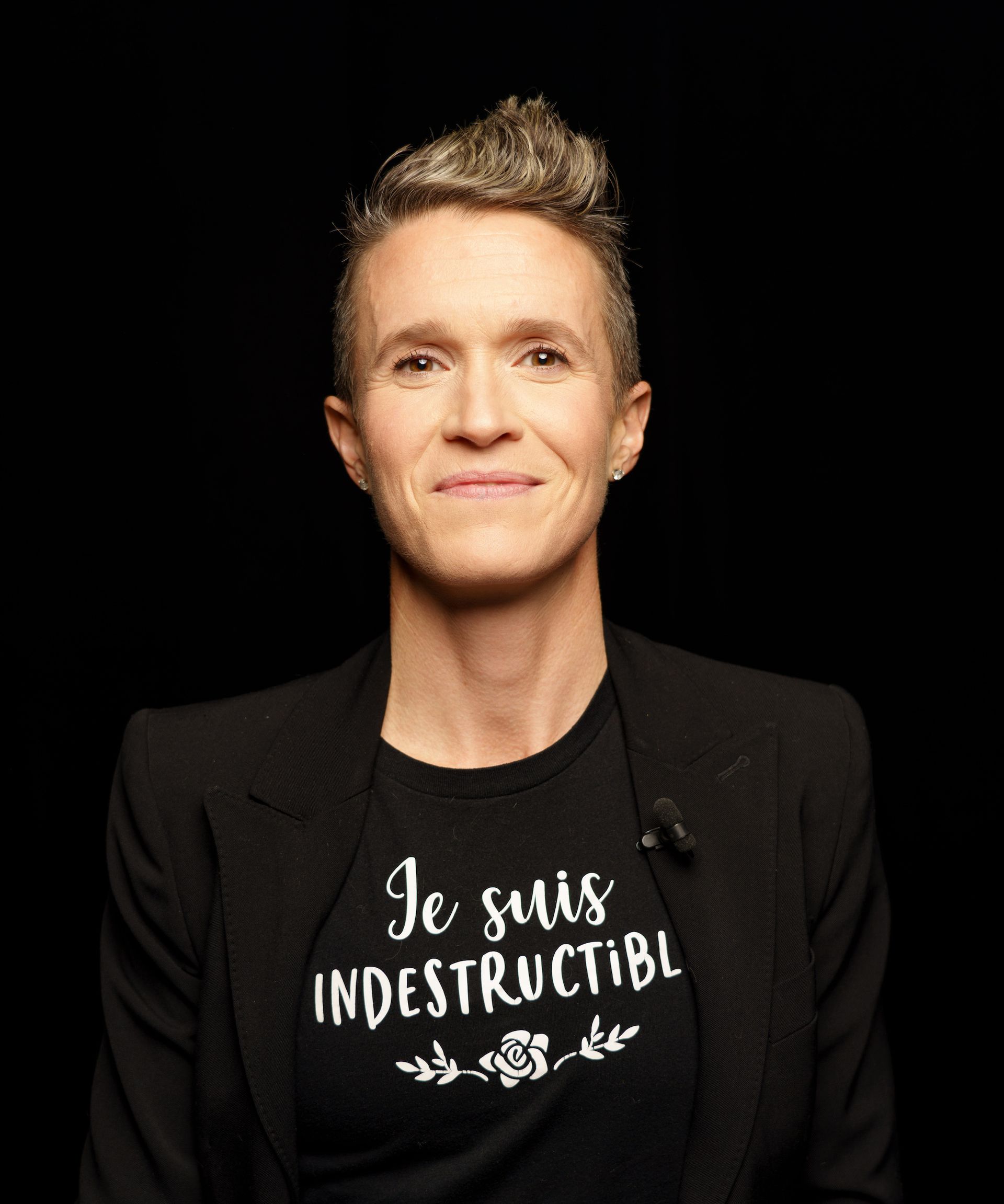
Geneviève Jeanson today
The bike: a final hurdle to overcome
These days Jeanson is a frequent public speaker and involved with various projects around safeguarding athletes including the International Testing Agency and Sport’Aide, a non-profit organization that offers guidance and support services for young athletes —as well as coaches, sport organizations, officials around them—who have witnessed or experienced violence.
“It feels really good to share my story and have something good come out of all that trauma,” Jeanson says. “Hopefully I can help people, but at the same time, man, I feel so exposed.”
Does she wish she’d shared her story earlier? Yes, of course. But she wasn’t ready.
“It’s one of the things you learn about recovery. There are many phases and you can’t rush it. It takes time. It’s like Tetris. All the pieces will fall into place at the right time, and when it does, it is going to be good.”
The final piece of Jeanson’s Tetris was her return to bike racing. She’d been barely more than a young adult when she last competed. Now, in her forties, she’s needing to work through the remnants of misguided and abusive coaching.
“Going back to the bike, and to racing specifically, brought up a whole different set of emotions. And it’s something I've been working on with my therapist,” she says.
Jeanson returned to racing at Mid South 2022. Largely considered the gravel season opener, Mid South, formerly known as Land Run, is a 100-mile race held on the infamous red clay of Stillwater, Oklahoma.
She was attracted to gravel racing for the same reasons why it’s the fastest growing discipline in cycling: the adventure, the community and “to battle your own demons and keep going.”
And Jeanson has more demons to conquer than most.
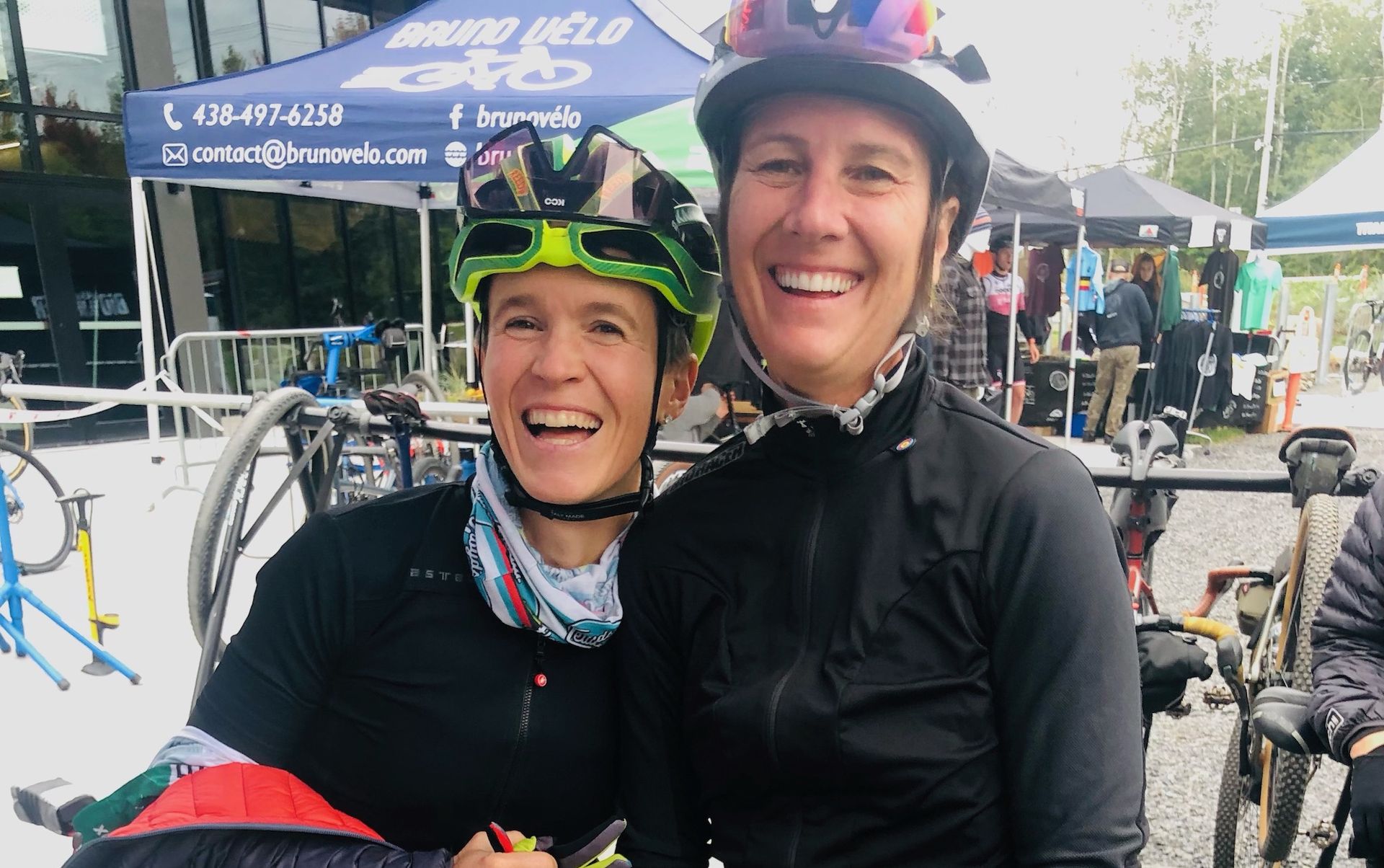
Geneviève Jeanson with her former arch-rival Lyne Bessette
“In my first career I was motivated by fear,” Jeanson reveals. “If I didn't win, if I had a bad training session, I got beat up. My fear, my survival mode made me a super athlete. It really gave me another level of suffering that I could handle in the training and in races. I could bury myself because I was afraid of what awaited me if I didn’t. It has taken years to get over that fear. I still feel it during really hard trainings although I know the thing I’m afraid of is no longer there.”
What did it feel like to pin on her first race numbers in 17 years?
“Good but I was also nervous. I didn't feel good in a pack. I felt like I didn't belong there at all,” Jeanson recalls. “But I finished a race and I knew I would do another one. So I did the Belgian Waffle Ride. Almost 220 kilometers! I never did anything like that in my career. But I finished and loved it so I decided to do another one.”
And so Jeanson’s second career as a gravel racer was born.But more importantly, Jeanson was made whole.
“I work and I race part time. My life has balance. I can give myself to others and help others achieve their goals,” she says.
“I feel more like myself this year at 41 years old than I've ever felt in my life. When I was just an athlete in an abusive relationship, I always knew that there was this second Geneviève somewhere. And then when I was off the sport and trying to stay away from it — because I didn’t want to feel all these emotions — I was missing something. I didn't know what I was missing until I started racing and cycling again.
“By returning I did find myself and the fitter I am, the more I feel like myself.”
Jeanson admits that when she learned that the 2026 UCI Road World Championships are going to be held in Montreal, Canada, she was tempted to return to road racing. To go all in and hope that at 44 years of age, she could once again represent her country. But to what end?
For now, she’s seeking her challenges on the dirt, including some endurance events like the 500km Gravel Bikepacking Challenge 500 (GBC) and 725km Badland off-road race in Spain which she's tackling together with former arch-rival Lyne Bessette. The two Queboise retired roadies put aside differences once Bessette learned about Jeanson’s past and have since become good friends.

Thank you for reading 10 articles this month* Join now for unlimited access
Enjoy your first month for just £1 / $1 / €1
*Read 5 free articles per month without a subscription

Join now for unlimited access
Try first month for just £1 / $1 / €1

Cycling Weekly's North American Editor, Anne-Marije Rook is old school. She holds a degree in journalism and started out as a newspaper reporter — in print! She can even be seen bringing a pen and notepad to the press conference.
Originally from The Netherlands, she grew up a bike commuter and didn't find bike racing until her early twenties when living in Seattle, Washington. Strengthened by the many miles spent darting around Seattle's hilly streets on a steel single speed, Rook's progression in the sport was a quick one. As she competed at the elite level, her journalism career followed, and soon she became a full-time cycling journalist. She's now been a cycling journalist for 11 years.
-
-
 Closing the gap: David Gaudu emerges from Paris-Nice more confident than ever before
Closing the gap: David Gaudu emerges from Paris-Nice more confident than ever beforeThe Groupama-FDJ rider finished second overall at the Race to the Sun, but gained more than just the result
By Adam Becket • Published
-
 Goodbye lime: We need to talk about the Tour de France green jersey
Goodbye lime: We need to talk about the Tour de France green jerseyThere's change afoot at ASO's French races, with the combativity colour also undergoing a revamp
By Adam Becket • Published
-
 Motherhood or an athletic career? An impossible choice no more thanks, in part, due to the rise of esports
Motherhood or an athletic career? An impossible choice no more thanks, in part, due to the rise of esportsWith the rise of virtual cycling esports, world-class female endurance athletes no longer have to compromise motherhood and a professional career.
By Christopher Schwenker • Published
-
 Errant horse interrupts the racing at women’s Strade Bianche
Errant horse interrupts the racing at women’s Strade BiancheDemi Vollering accompanied by the animal on her way to victory
By Stephen Puddicombe • Published
-
 29 cases of alleged doping recorded in cycling in 2022, but only one at WorldTour
29 cases of alleged doping recorded in cycling in 2022, but only one at WorldTourMost came from semi-professional ranks, MPCC finds
By Tom Davidson • Published
-
 Spanish police crack down on doping ring, former Kelme coach questioned
Spanish police crack down on doping ring, former Kelme coach questionedMiguel Ángel López denies any involvement in statement
By Adam Becket • Last updated
-
 UCI suspends continental team's licence due to doping investigation
UCI suspends continental team's licence due to doping investigationW52-FC Porto cannot compete in any races after an investigation conducted by the Anti-Doping Authority of Portugal
By Ryan Dabbs • Last updated
-
 Dr Hutch: Why women were the pioneers of bike racing
Dr Hutch: Why women were the pioneers of bike racingIf it wasn't for female riders, we'd all still be falling off our Penny Farthings
By Michael Hutchinson • Published
-
 Beryl Burton: Meet the British legend
Beryl Burton: Meet the British legendFrom the 50s to the 80s, Beryl Burton dominated British women’s racing, CW looks back at her prolific career
By Hugh Gladstone • Published
-
 Club life: Why do some cycling clubs attract so many more female members?
Club life: Why do some cycling clubs attract so many more female members?Many clubs say they want to expand their female membership, but some have far greater success than others. Amy Sedghi finds out how these clubs get it so right
By Amy Sedghi • Published
